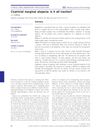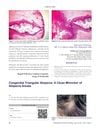 48 citations,
March 2019 in “Frontiers in Physiology”
48 citations,
March 2019 in “Frontiers in Physiology” Wounds on the face usually heal with scars, but understanding how some wounds heal without scars could lead to better treatments.
 44 citations,
September 2012 in “Archives of Dermatology”
44 citations,
September 2012 in “Archives of Dermatology” Hair breakage may be an early sign of a hair loss condition called CCCA in African American women.
 36 citations,
January 2006 in “Veterinary Dermatology”
36 citations,
January 2006 in “Veterinary Dermatology” Cyclosporin effectively and safely treated skin diseases in three pets with no side effects.
 35 citations,
January 2006 in “Journal of Dermatological Treatment”
35 citations,
January 2006 in “Journal of Dermatological Treatment” Zinc can help with some skin problems, but its effectiveness varies depending on the condition.
 27 citations,
September 2008 in “British Journal of Dermatology”
27 citations,
September 2008 in “British Journal of Dermatology” Traction may not be the only cause of cicatricial marginal alopecia.
 13 citations,
January 2011 in “International Journal of Trichology”
13 citations,
January 2011 in “International Journal of Trichology” CTA is often mistaken for AA but doesn't respond to steroids and may require hair transplantation.
 12 citations,
May 1989 in “Postgraduate Medicine”
12 citations,
May 1989 in “Postgraduate Medicine” The document concludes that hair loss is common and can be treated with medications like minoxidil or surgical options, and it significantly affects people's psychological well-being.
 11 citations,
June 2022 in “Frontiers in immunology”
11 citations,
June 2022 in “Frontiers in immunology” New protein changes may be involved in the immune attack on hair follicles in alopecia areata.
 7 citations,
January 2012 in “International Journal of Trichology”
7 citations,
January 2012 in “International Journal of Trichology” Two siblings both had a rare case of alopecia areata at the same time.
 March 2024 in “Journal of Natural Remedies”
March 2024 in “Journal of Natural Remedies” An 18-year-old with hair loss saw hair regrowth after treatments combining microneedling, cupping, medication, and oil application.

OCT can effectively screen and diagnose various medical conditions non-invasively.
 April 2018 in “Journal of Investigative Dermatology”
April 2018 in “Journal of Investigative Dermatology” The document concludes that ERBB2 mutations are common in extramammary Paget disease and may respond to systemic treatments like cancer immunotherapy.
December 2018 in “International journal of women’s dermatology” FFA in young women is often missed, and no single treatment works best.
 48 citations,
May 2013 in “Canadian Medical Association Journal”
48 citations,
May 2013 in “Canadian Medical Association Journal” Primary cicatricial alopecia, a rare disorder causing permanent hair loss, is hard to diagnose and treat, with treatments like anti-inflammatory drugs and steroids offering varied results and no guaranteed cure. Psychological support for patients is important, and future research should aim to identify causes of the condition.
 30 citations,
August 2015 in “JAAD case reports”
30 citations,
August 2015 in “JAAD case reports” Platelet-rich plasma (PRP) injections successfully treated a woman's steroid-resistant hair loss, causing hair to regrow within a month.
11 citations,
January 2013 in “International Journal of Trichology” Emotional factors are crucial in treating and preventing scalp neurodermatitis and hair loss.
9 citations,
September 2018 in “JAAD Case Reports” Lichen planopilaris can be triggered by prolonged scalp traction and can be treated with corticosteroids.
8 citations,
January 2013 in “International journal of trichology” Two people had unusual ring-shaped hair loss due to an autoimmune disorder.
 7 citations,
January 2017 in “International Journal of Trichology”
7 citations,
January 2017 in “International Journal of Trichology” Hair transplant can cause hard-to-treat keloids in some patients.
2 citations,
January 2019 in “Skin appendage disorders” Early diagnosis and quick treatment improve life quality for FFA patients.
 1 citations,
May 2022 in “Frontiers in Psychiatry”
1 citations,
May 2022 in “Frontiers in Psychiatry” Hair loss was the first sign of a brain-related complication in a woman with lupus, and early treatment helped her hair grow back.
 February 2024 in “Journal of cutaneous and aesthetic surgery”
February 2024 in “Journal of cutaneous and aesthetic surgery” The combined treatment helps improve severe hair loss and reduces the need for other medications.
 February 2024 in “Journal of dermatology”
February 2024 in “Journal of dermatology” CGF therapy may help hair regrowth and improve scars in DLE patients.
 November 2023 in “Aktualʹnì problemi sučasnoï medicini”
November 2023 in “Aktualʹnì problemi sučasnoï medicini” The guidelines suggest using various treatments, including antidepressants and steroids, for alopecia areata and discuss the condition's genetic and immune aspects.
September 2013 in “Canadian Medical Association Journal” Alopecia areata causes sudden hair loss, often resolves within a year, but can recur.
 38 citations,
January 2019 in “International Journal of Women's Dermatology”
38 citations,
January 2019 in “International Journal of Women's Dermatology” The document concluded that more research is needed to find the best treatment for Frontal fibrosing alopecia.
 23 citations,
September 2019 in “Dermatology practical & conceptual”
23 citations,
September 2019 in “Dermatology practical & conceptual” The study concluded that AAI and DAA are forms of the same disease, with different symptoms in men and women, and that corticosteroid treatment is effective.
7 citations,
January 2014 in “International Journal of Trichology” Primary idiopathic pseudopelade of Brocq causes gradual, scarring hair loss with no effective treatment.
 1 citations,
July 2023 in “Journal of Clinical Medicine”
1 citations,
July 2023 in “Journal of Clinical Medicine” Different causes of beard hair loss have various treatments, including medications, lifestyle changes, and procedures to stimulate hair growth.
1 citations,
August 2005 in “Springer eBooks” Alopecia areata is an autoimmune disease with genetic links, treatable with certain medications, and can affect mental health.






















